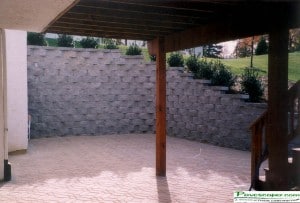 Does your basement feel like a jungle in Central America during the Winter? Maybe it’s time to check the humidity levels in your basement.
Does your basement feel like a jungle in Central America during the Winter? Maybe it’s time to check the humidity levels in your basement.
Humidity refers to the amount of moisture in the air. When air has absorbed all the moisture that it can, we say that humidity is at 100%. When the humidity level is at say half of that, it is defined as being at 50%. In other words, measures of humidity are relative, which is why we speak of RH, or relative humidity.
The Effect of Seasons
Everything expands as it gets warmer, and that applies to the air itself. As a consequence, it absorbs more moisture when the ambient temperature’s warmer. This is why us homeowners in Toronto are plagued by humidity when the heating’s turned up in their basements – especially in winter when the windows and doors are tightly closed.
You can track humidity by purchasing a mechanical or electronic hygrometer that records the RH, although you do need to allow the instrument to settle for twelve hours first. Note that the same absolute moisture-level will produce a different relative reading at different ambient temperatures.
The Human Factor
What we described so far is theoretical. Humans have a habit of changing their environment everywhere we go (and that includes our homes). Air pollution and global warming are extreme examples. It may come as a shock to know that even breathing affects the relative humidity in your home.
Most everything we do in our home involves the use of energy. Energy that is released warms the air. Warm air absorbs more moisture. Up goes the humidity level. It’s as simple as that. But we don’t stop there, do we? We release moisture into the air every time we bath or shower, wash dishes or do the laundry.
The Right Humidity
Our bodies require a level of humidity for health. When it’s too high we may develop respiratory problems because of mould spores drifting through the air. By contrast, if the RH is too low we get scratchy throats and noses, and chapped skin and lips. These are Mother Nature’s natural hygrometers we need to listen too.
After you’ve purchased a mechanical or electronic hygrometer, you can assess humidity more accurately, although do remember that hygrometer readings are relative to ambient temperatures. When your home is nice and snug in winter, it should range between 30 and 50 percent. However when the outside temperature drops to -10c / 14F, you should aim for 30.
When Humidity’s Too High
You can use humidifiers and dehumidifiers to control relative humidity selectively. However you can also influence things by venting clothes-driers, opening doors and windows daily, and taking cooler showers and baths. As you bring your humidity levels down you’ll also have less mould. And that should make your family healthier, happier and more relaxed.
photo credit: Flckr









